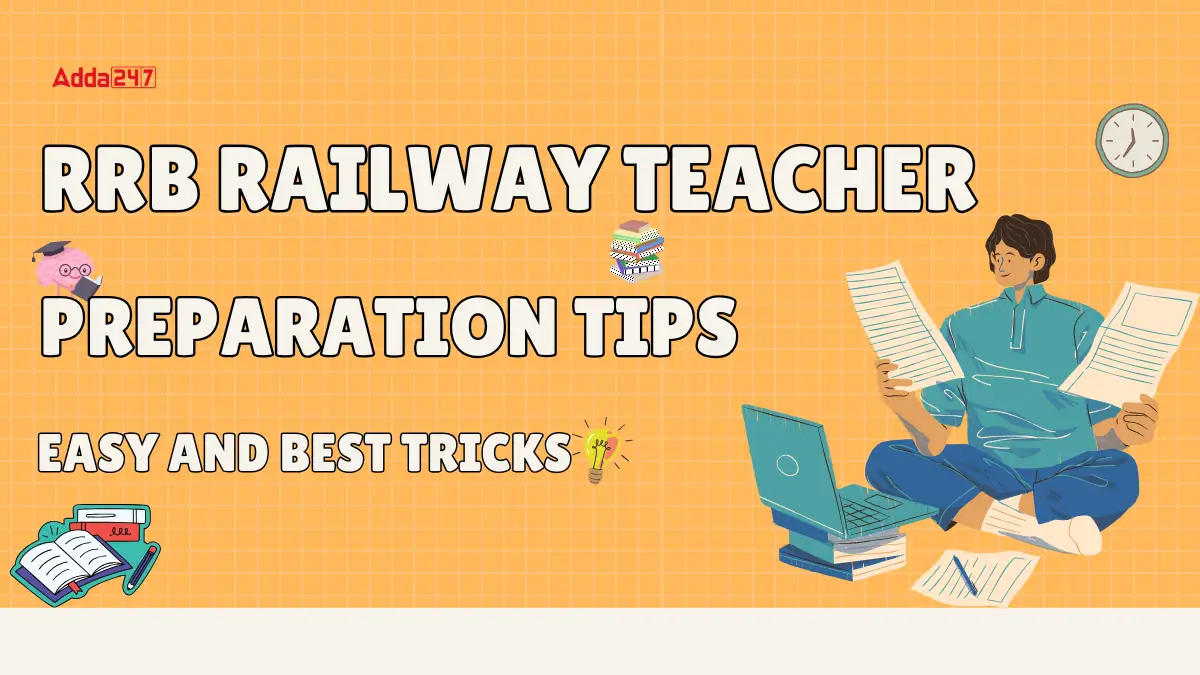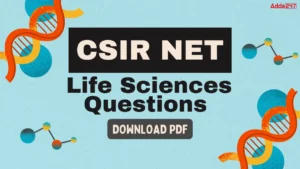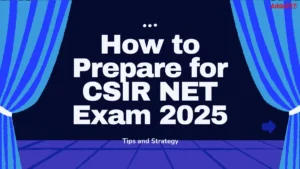Table of Contents
To excel in the RRB Teacher Exam 2025 for PGT, TGT, PRT, and other teaching and non-teaching posts, candidates must adopt smart strategies and effective preparation techniques. A thorough understanding of the exam pattern and syllabus is essential, along with a well-structured study plan that prioritizes weak areas. Utilizing quality study materials like NCERT books, previous years’ papers, and standard references can enhance preparation. Regular mock tests, quizzes, and practice papers help improve speed and accuracy, while short notes and flashcards aid in quick revision. Staying updated with current affairs and general knowledge, managing time effectively, and maintaining a healthy, stress-free routine are crucial for success. By following these strategies, candidates can boost confidence and maximize their chances of qualifying for the RRB Teacher Exam 2025.
RRB Railway Teacher Preparation Tips
Preparing for the RRB Railway Teacher Exam requires a strategic and focused approach. Start by understanding the exam pattern, including key sections like Education, Psychology of Learner & Teaching, and Curriculum & Instruction. Prioritize high-weightage topics, strengthen your basics using standard books, and enhance accuracy with previous year papers and mock tests. A structured study schedule with achievable daily goals and regular revision is essential for concept retention. Stay updated on educational trends, use mnemonics for better memory, and maintain a healthy lifestyle with proper sleep and nutrition to perform optimally. Let’s explore the RRB Railway Teacher Preparation Tips in detail in the next section.
Understand the Exam Pattern
A clear understanding of the RRB Railway Teacher Exam pattern is crucial for effective preparation. The exam will be conducted in CBT mode and will consist of 50 objective-type multiple-choice questions, each carrying 1 mark, with a penalty of 1/3 mark for every incorrect answer. For PGT and TGT aspirants, the questions are categorized into three sections: Education (22–28 questions), Psychology of Learner & Teaching (13–18 questions), and Curriculum & Instruction (8–12 questions). This structured division underscores the need for a targeted preparation strategy to maximize accuracy and performance.
Key Sections to Focus:
- Education: Covers educational philosophy, sociology, values, democracy, and integration.
- Psychology of Learner & Teaching: Focuses on psychology concepts, intelligence theories, and learning methodologies.
- Curriculum and Instruction: Curriculum Development, Transaction, Instructional Methods – Teacher- Controlled Instruction (TCI); Learner-Controlled-Instructions (LCI); Group-Controlled Instruction (GCI); Skills and Competencies; Means of Instruction Delivery.
Create a Study Schedule
A well-structured study plan is key to maintaining consistency and focus while preparing for the RRB Railway Teacher Exam. Allocate study time based on the weightage of each section, prioritizing high-scoring topics like Education for a thorough understanding. Set clear daily and weekly goals to track progress, ensuring regular revision of all subjects. To prevent burnout, incorporate short breaks between study sessions, keeping your mind refreshed. This balanced approach will enhance motivation, boost retention, and ensure steady progress throughout your preparation.
- Allocate Time for Each Section: Dedicate more hours to topics with higher weightage, such as the Education section.
- Set Daily and Weekly Goals: Ensure regular completion of topics and revision.
- Incorporate Breaks: Avoid burnout by scheduling short breaks between study sessions.
Strengthen Your Basics
To excel in the RRB Teacher Exam, candidates must develop a strong understanding of educational psychology, curriculum development, and sociological aspects of education. Mastering these foundational concepts not only enhances exam performance but also enriches overall knowledge of the education system. For comprehensive learning, refer to NCERT books, educational psychology textbooks, and curriculum design materials, as these resources offer in-depth coverage of essential topics. A structured approach to studying these subjects ensures clarity, aiding both exam preparation and practical teaching applications.
- Understand Concepts: Focus on foundational topics like educational psychology, curriculum development, and sociological aspects of education.
- Use Standard Books: Refer to NCERT books, educational psychology resources, and curriculum design textbooks for in-depth knowledge.
Practice Objective Questions
Given the objective nature of the RRB Teacher Exam, consistent practice is essential for success. Begin by solving previous year papers to understand question patterns and difficulty levels, giving you a clear idea of what to expect. Additionally, taking mock tests helps simulate real exam conditions, improving time management and accuracy under pressure. After each test, carefully analyze your mistakes to identify weak areas, allowing focused revision on topics that need improvement. This structured approach enhances preparation, boosts confidence, and ensures optimal performance on exam day.
- Solve Previous Year Papers: Familiarize yourself with question patterns and difficulty levels.
- Take Mock Tests: Simulate exam conditions to improve time management and accuracy.
- Analyze Mistakes: Review incorrect answers to identify and strengthen weak areas.
Focus on Time Management
To excel in the RRB Teacher Exam, maintaining a balance between speed and accuracy is crucial. Practice solving all 50 questions within a set timeframe to improve time management and ensure efficiency under exam conditions. Familiarizing yourself with the exam’s pace enhances your ability to perform under pressure. Additionally, avoid spending too much time on challenging questions- skip them and tackle the easier ones first to maximize your score. If time permits, revisit the difficult questions later with a fresh perspective, ensuring a strategic approach to boost overall performance.
- Speed and Accuracy: Practice solving 50 questions within a set timeframe without compromising accuracy.
- Skip Tough Questions: Avoid spending too much time on difficult questions; return to them later if time permits.
Stay Updated on Current Education Trends
A strong understanding of Child’s Rights and Human Rights Education within the framework of Democracy and Education is crucial for the RRB Teacher Exam. Staying updated with recent reports, guidelines, and global trends helps in grasping the significance of human rights in education. Additionally, understanding the sociological role of the Indian education system is essential, as it shapes societal values, fosters social change, and promotes equality. Education influences key aspects of Indian society, including culture, socialization, and development. A well-rounded perspective on these topics will not only enhance your knowledge but also improve exam performance.
- Child’s Rights and Human Rights Education: These are crucial topics under Democracy and Education. Stay informed by reading recent reports and guidelines.
- Indian Education System: Understand the sociological role of education in Indian society.
Use Mnemonics and Visualization Techniques
Mnemonics are a powerful tool for retaining key information, especially when it comes to complex topics like cultural heritage and values. By creating simple, memorable phrases or acronyms, you can easily recall important concepts and ideas. Additionally, visual aids such as mind maps and flowcharts can help simplify intricate topics by organizing information in a clear and structured way. These visual tools not only make it easier to understand relationships between different concepts but also aid in quick revision and effective learning, enhancing both comprehension and memory retention.
- Mnemonics can help remember key points, especially for topics like cultural heritage and values.
- Visual aids like mind maps and flowcharts simplify complex topics.
Join Study Groups or Coaching Classes
Collaborating with peers or enrolling in coaching programs tailored specifically for the RRB Teacher Exams can significantly enhance your preparation. Adda247 offers comprehensive coaching for RRB Teacher Exams, providing expert guidance, personalized study plans, and access to a community of like-minded aspirants. Engaging with fellow candidates through Adda247’s interactive sessions and doubt-clearing forums can help you resolve queries, share valuable insights, and stay motivated throughout your preparation journey. With Adda247’s expert-led courses, you can ensure you’re on the right track, stay consistent, and boost your chances of success in the exam.
Stay Consistent with Revision
In the final weeks before the RRB Railway Teacher Exam, focus solely on revision, prioritizing high-weightage topics like Education and Psychology of Learners. Reinforce your understanding using summary notes and flashcards to quickly review key concepts and important facts. This targeted approach enhances recall, boosts confidence, and ensures efficient and effective preparation, ultimately helping you maximize your performance on exam day.
- Dedicate the last few weeks solely to revision.
- Focus on high-priority topics like Education and Psychology of Learners.
- Use summary notes and flashcards for quick revision.
Maintain a Healthy Lifestyle
Maintaining a balanced diet, getting adequate sleep, and engaging in physical activity are crucial for optimal exam preparation. Eating nutritious meals helps keep your mind sharp and enhances cognitive function, enabling better focus during study sessions. Ensuring 7-8 hours of sleep each night allows your brain to rest and rejuvenate, improving concentration and memory retention. Incorporating light exercises, such as walking or stretching, helps reduce stress, boost energy levels, and improve overall mental clarity, making it easier to stay focused and perform well during the exam.
- Balanced Diet: Eat nutritious meals to keep your mind sharp.
- Adequate Sleep: Ensure 7-8 hours of sleep daily for better focus.
- Physical Activity: Engage in light exercises to reduce stress and enhance concentration.
Conclusion
Preparing for the RRB Teacher Exam 2025 requires a blend of knowledge, strategic planning, and disciplined execution. By focusing on key sections, practicing regularly, and revising thoroughly, candidates can maximize their chances of success. Stay confident, follow these tips, and work consistently towards achieving your dream of becoming a railway teacher.




 CSIR NET Life Sciences Questions with De...
CSIR NET Life Sciences Questions with De...
 How to Prepare for CSIR NET Exam 2025, E...
How to Prepare for CSIR NET Exam 2025, E...
 CSIR NET Subject List with Code Official...
CSIR NET Subject List with Code Official...














